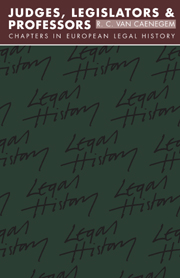2 - THE MASTERY OF THE LAW: JUDGES, LEGISLATORS AND PROFESSORS
Published online by Cambridge University Press: 24 October 2009
Summary
SOME FACTS
The historical facts are not difficult to summarise. Various European countries have seen the control of the law pass through various hands, i.e. those of the judiciary, the legislature, or the schools. This is not to say, of course, that there were periods or countries where one such controlled the law exclusively: there has always been some case law, some legislation and some writing about legal matters. Only the fully feudalised era of say the tenth and eleventh centuries on the continent was almost totally devoid of legislation and legal learning. Certain periods and countries, however, have witnessed so marked a preponderance of one of these groups of people that it could be considered the essential ‘maker of the law’. Thus it is clear that the common law was judge-made, that medieval and modern Roman law (which could be called the neo-Roman law of western Europe) was professor-made and that an enormous mass of French revolutionary law was legislator-made.
The reader will notice that there is here a connection with the traditional theory of the ‘sources of the law’. These, as every undergraduate knows, are custom (as fixed and formulated by judgments), legislation and jurisprudence. However, ‘custom’ and ‘case law’, ‘legislation’ and ‘jurisprudence’ will not be treated as abstract intellectual entities, but investigated as the voices of certain groups of people expressing particular social and political forces in society.
- Type
- Chapter
- Information
- Judges, Legislators and ProfessorsChapters in European Legal History, pp. 67 - 112Publisher: Cambridge University PressPrint publication year: 1987
- 2
- Cited by



